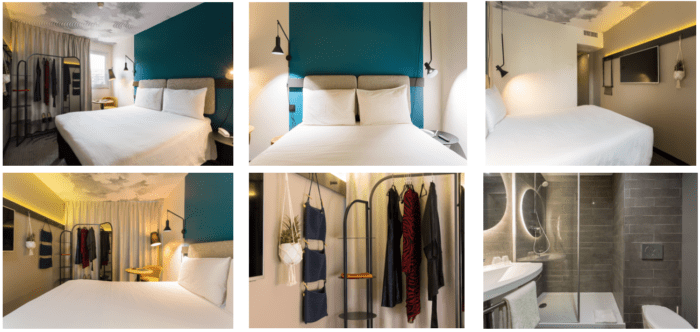Our business, as an investor, owner and employer, could not be conceived otherwise than on the basis of a responsible hotel business.
AccorInvest’s strong commitment to environmental, societal and economic issues has led us to reflect on a new Design Strategy.
Controlling the carbon footprint, circularity, operability/people’s well-being and cost optimization are the foundations of this strategy, on which the ” IBIS KAI ” concept was designed in close collaboration with Accor teams.

“Our objective was to implement measurable KPI’s linked to our strategy.ie Design. This circular signature of Ibis KAI becomes a reference and a prerequisite for future hotel room design projects operated by Accorinvest .
Franck Bermond
VP Construction Asset Management.
Why is this room so virtuous?
Because it is an attractive, timeless concept with the resilience to go through longer life cycles.
=> Less production = reduction of theCarbon Footprint.
Because it has been designed in a “circular”, flexible and modular way so that thesecond life of equipment is no longer an option.
=> Reuse and waste reduction.
=> Easy to renovate
Because good operability and well-being have been taken into account in the design, in its ergonomics and in the right choice of materials.
=> The room is thus a healthy and comfortable place for our customers and employees with adapted equipment: simple to use and easy to maintain.
Because the Optimization of the renovation costs and a reduction of the downtime of the room, we will be able to plan more full renovations and increase the number of renovated rooms per year.

“The deployment of the Design strategy in our hotels will ultimately enable Accorlnvest to assert its role as a responsible investor, owner and operator .
Virginia Payet
Director of Programs & Design, Accorinvest Corporate.
Measuring for progress
This design process, was accompanied by the firm Upcyclea, specialized in the circular economy and the positive impact of Cradle to Cradle (C2C).
Through the digital platform “myUpcyclea”, we were able to create “Circular Passports” for all the equipment/products that make up the room and thus measure their environmental performance.
The analysis was based on the following criteria:
Product composition: breakdown into components and materials, disassembly
Uses and cycles: next uses of the product, period of use, incorporation of recycled material
Environmental and social performance: C2C certificate, carbon footprint and energy mix, water management, and social responsibility in manufacturing.
The Circular Passports are a key tool for the visibility and traceability of the resources present in the room until its end of use.
They allowed us to measure the circular signature of the Ibis room, consisting of the following three indicators: Carbon Footprint, Non-toxicity and Degree of Circularity.

“Accor’s referenced suppliers have been quite receptive to this approach, which has led them to ask new questions about their products. They were able to mobilize to collect the data requested in the circular passport .
Naffie Kante
Project Manager, Accorinvest Corporate.
The Ibis Kai circular signature
This circular signature illustrates the performance of the Ibis KAI room concept in a quantitative and global way. These indicators reflect the eco-design efforts made by Accorlnvest, and allow us to identify areas for improvement in the future.
Editor’s note: This article was co-authored by AccorInvest’s Corporate Design & Construction team (Franck Bermond – VP Design & Construction, Virginia Payet – Director of Design and Programs, Naffie Kante – Project Manager) to share their experience of designing a circular room with Upcyclea and its software myUpcyclea.
To learn more and access the case study by Upcyclea, click
here
.

